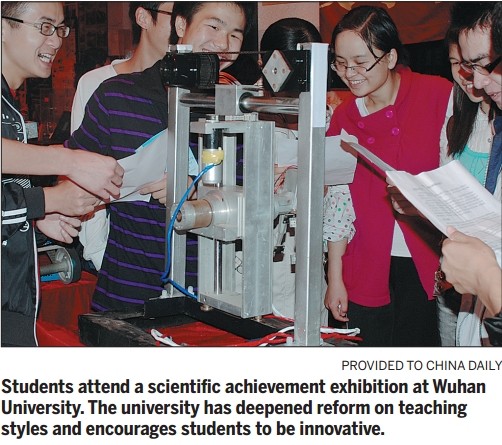编者按:《中国日报》2014年2月24日发表文章,报道我校在培养学生创新、创业能力方面的一系列重要举措,认为对激发学生创业意识和支持创业起步发挥着积极的作用。全文如下:

Xie Mengfei's WeChat account "Wuhan University Assistant" has attracted more than 20,000followers as it provides course results, class information and even lectures.
Since its launch last February, his account on the popular text and voice messaging app hasbeen dubbed the "Siri of Wuhan University" by his followers after a famous phone app.
Thanks to Wuhan University's unique credits system, Xie, 21, a junior computer science major,has already achieved all his necessary credits for the year and dropped all his courses for the second semester.
The extra free time gives him room to explore software such as the "Wuhan University Assistant" plug-in for his WeChat account.
As early as 2006, Wuhan University introduced its innovation credits, which allowed undergraduates to work on scientific research, do pioneering work and participate in socialactivities according to their specialties and interests while at school.
Based on student achievements, a reviewing committee would then award credits.
Wuhan University has deepened reform on teaching styles and encouraged more students to be innovative.
To inspire this creativity, the university allocated more than 2 million yuan ($330,500) to set upthe innovative practice project and opened key national labs and engineering research centers to undergraduates.
It also invested 19 million yuan to build the engineering practicing innovation center.
"We have gradually formed a relatively mature planning process and managing system throughyears of constant exploration and practice," said Chen Chuanfu, the dean of the undergraduate college at Wuhan University.
Recently, a figure disclosed by Zhang Xiaoqiang, deputy director of the National Developmentand Reform Commission, caused widespread debate in China's academic world.
While attending an international forum, Zhang said that Chinese patents in science andtechnology accounted for just 10 percent, far less than the 40 percent of developed countries.
To encourage students to dream big, the university set up a club in April 2013 that gave them aplatform to discuss business ideas with each other and a space to put the ideas into action.
"We need to work at full throttle to cultivate students' interest in entrepreneurship," said ChenChuanfu.
"We also need to strengthen guidance in students' entrepreneurial practices so they can workout how to start up businesses so we can give them support if they fear failure."
To improve students' innovation and entrepreneurial competence, Wuhan University hasfurther strengthened its approval of students' research and development projects.
From 2006 to 2013, the number of student innovation projects at the university reached 4,549,with approved funding of the projects totaling 8.48 million yuan.
Of these, 589 are at national level with a total of 5.71 million yuan funded by the Ministry ofEducation.
The remainder involve amateur science research with more than 2.77 million yuan offered bythe university.
"Wuhan University's development strategy is 'to hold up to the sky and down to the earth',which means that our level of teaching and research should be high and we should also solidlyimplement those policies that encourage innovation," said Li Xiaohong, president of the university.
http://www.chinadaily.com.cn/cndy/2014-02/24/content_17300124.htm
